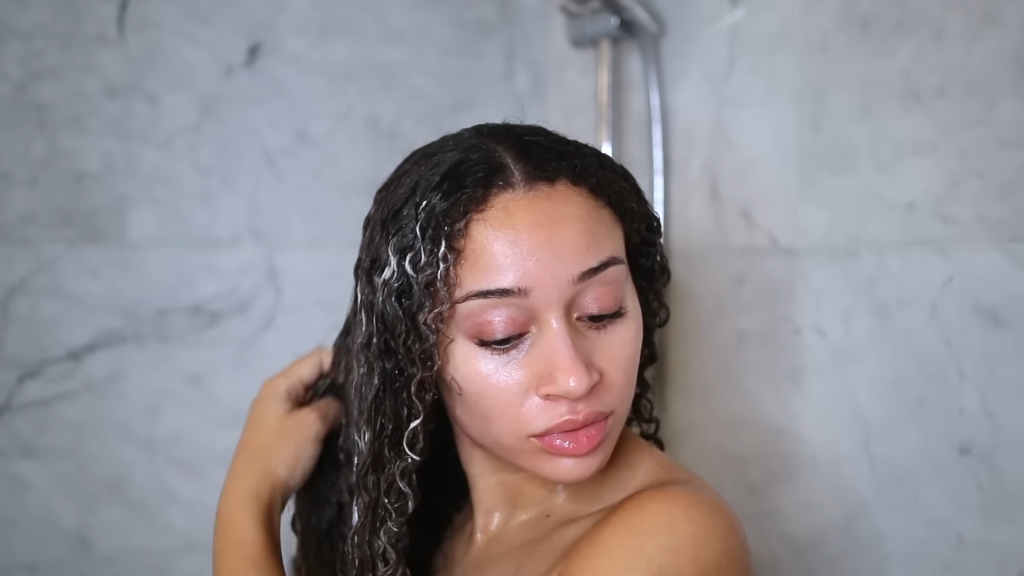Discover the top hydrating shampoo options specifically designed for coily hair.
The Best Hydrating Shampoo for Coily Hair
If you have coily hair, you know how important it is to keep it hydrated. Coily hair has a unique structure that makes it prone to dryness and breakage. In this article, we will discuss the benefits of using a hydrating shampoo for coily hair and introduce some top brands that cater specifically to this hair type. We will also provide tips on how to choose the right hydrating shampoo and how to use it effectively for maximum results.

Understanding Coily Hair
Coily hair is characterized by its tightly coiled or curly pattern. It is common among individuals of African and Afro-Caribbean descent, but can also be found in other ethnicities. The unique structure of coily hair sets it apart from other hair types.
The Unique Structure of Coily Hair
Coily hair has a natural spiral shape that can range from tight coils to looser curls. The individual strands of coily hair have a flat, ribbon-like structure, which makes them more prone to dryness and breakage. This is because the natural oils produced by the scalp have a harder time traveling down the hair shaft, leading to a lack of moisture.
However, the unique structure of coily hair also comes with its advantages. The tightly coiled pattern creates a natural barrier that protects the hair from external elements such as UV rays and pollutants. This can be seen as a built-in defense mechanism, as the coils help to shield the hair from damage.
Another interesting aspect of coily hair is its versatility. The tight coils can be stretched and elongated, allowing for various styling options. From twist-outs to braid-outs, coily hair offers a wide range of possibilities for expressing personal style and creativity.
Common Problems Associated with Coily Hair
Dryness and frizz are common issues for those with coily hair. The lack of moisture retention can cause the hair to become dull, brittle, and prone to breakage. Coily hair is also more susceptible to tangling and knotting, which can lead to hair damage during detangling. Additionally, the tight curls of coily hair can make it harder for natural oils to distribute evenly, resulting in an uneven scalp and hair health.
However, with proper care and maintenance, these problems can be minimized. Deep conditioning treatments, moisturizing products, and protective styling can help to combat dryness and promote healthy hair growth. Regular detangling sessions using wide-toothed combs or fingers can also prevent excessive breakage and minimize tangling.
It’s important to note that coily hair is not a problem to be solved, but rather a unique and beautiful hair type that deserves love and appreciation. Embracing the natural texture and learning how to care for it can lead to healthier, happier hair.
In conclusion, coily hair is a fascinating hair type with its own set of characteristics and challenges. Understanding its unique structure and common problems can help individuals with coily hair to develop a personalized hair care routine that enhances its beauty and promotes its health.
How to Choose the Right Hydrating Shampoo for Your Coily Hair
Choosing the right hydrating shampoo for your coily hair is essential to maintain its health and hydration. Here are some factors to consider when selecting a hydrating shampoo:
Understanding Your Hair’s Specific Needs
Every individual’s coily hair is unique, so it’s important to understand your hair’s specific needs. Consider factors like hair porosity, texture, and any specific concerns you may have, such as damage or scalp conditions. This understanding will help you choose a hydrating shampoo that targets your specific hair needs.
Coily hair tends to have a higher porosity level compared to other hair types. This means that it absorbs moisture more easily but also loses it quickly. To combat this, you’ll want to look for a hydrating shampoo that not only adds moisture but also helps seal it in. Additionally, consider the texture of your coily hair. Some coily hair types may be finer and more prone to breakage, while others may be thicker and require more intense hydration.
Furthermore, if you have any specific concerns like damaged hair or scalp conditions such as dandruff or dryness, you’ll want to choose a hydrating shampoo that addresses those issues. Look for shampoos that contain ingredients known for their soothing or repairing properties, such as aloe vera or tea tree oil.
Ingredients to Look for in a Hydrating Shampoo
When looking for a hydrating shampoo for coily hair, certain ingredients can provide the extra moisture and nourishment your hair needs. Look for shampoos that contain ingredients like shea butter, coconut oil, argan oil, or hyaluronic acid. These ingredients are known for their hydrating properties and can help replenish and retain moisture in your coily hair.
Shea butter is a popular ingredient in hydrating shampoos for coily hair due to its rich emollient properties. It helps soften the hair, making it more manageable and reducing frizz. Coconut oil is another excellent ingredient as it penetrates deep into the hair shaft, providing intense hydration and preventing protein loss. Argan oil, often referred to as “liquid gold,” is packed with essential fatty acids and antioxidants that nourish and moisturize the hair, leaving it shiny and healthy. Hyaluronic acid, on the other hand, is a humectant that attracts and retains moisture, ensuring your coily hair stays hydrated for longer periods.
In addition to these ingredients, you may also want to look for shampoos that are free from sulfates, parabens, and other harsh chemicals. These ingredients can strip the hair of its natural oils, leading to dryness and further damage. Opting for a sulfate-free shampoo will help maintain the moisture balance in your coily hair.
Remember, finding the right hydrating shampoo for your coily hair may require some trial and error. What works for someone else may not necessarily work for you. Experiment with different products and pay attention to how your hair responds. With time and patience, you’ll discover the perfect hydrating shampoo that keeps your coily hair healthy, hydrated, and beautiful.
How to Use Hydrating Shampoo Effectively
Using a hydrating shampoo effectively is crucial to maximize its benefits for coily hair. Here are some best practices to follow:

Best Practices for Washing Coily Hair
Before applying the hydrating shampoo, make sure to thoroughly wet your hair to loosen any dirt, product buildup, or excess oil. This step is essential as it helps the shampoo to penetrate the hair strands more effectively. When your hair is wet, it becomes more receptive to the cleansing properties of the shampoo, resulting in a more thorough cleanse.
Once your hair is wet, start by applying a small amount of shampoo to your scalp. Gently massage the shampoo into your scalp using your fingertips. This massaging action not only helps to distribute the product evenly but also stimulates the scalp, promoting blood circulation and healthy hair growth.
While massaging the shampoo, focus on the scalp area as this is where most dirt and oil accumulate. By concentrating on the scalp, you ensure that all impurities are effectively removed, leaving your hair feeling clean and refreshed.
It’s important to note that when washing coily hair, you should avoid rough scrubbing. Coily hair is naturally more fragile and prone to tangling and breakage. Instead, use gentle circular motions to cleanse the scalp and allow the lather to work its magic.
After massaging the shampoo into your scalp, rinse your hair thoroughly with warm water. Ensure that all the shampoo is completely washed out, as any residue left behind can weigh down your hair and make it appear dull.
If necessary, you can repeat the shampooing process to achieve a deeper cleanse. However, keep in mind that over-shampooing can strip the hair of its natural oils, leading to dryness and brittleness. Finding the right balance is key.
Maximizing the Benefits of Your Hydrating Shampoo
To enhance the effectiveness of your hydrating shampoo, consider following up with a hydrating conditioner or deep conditioning treatment. These products can provide additional moisture and nourishment to your coily hair, helping to combat dryness and frizz.
When choosing a conditioner, opt for one that is specifically formulated for coily hair types. Look for ingredients such as shea butter, coconut oil, or argan oil, as these are known for their moisturizing properties. Apply the conditioner to the lengths and ends of your hair, avoiding the scalp area to prevent excess oiliness.
In addition to using hydrating hair products, it’s important to minimize heat styling and use heat protectants when necessary. Excessive heat can cause damage to coily hair, leading to breakage and loss of moisture. If you must use heat styling tools, make sure to apply a heat protectant spray or serum beforehand to create a barrier between your hair and the heat.
Furthermore, maintaining a healthy lifestyle can greatly contribute to overall hair health and hydration. Eating a balanced diet rich in vitamins and minerals, staying hydrated, and exercising regularly can all help to promote healthy hair growth and maintain moisture levels in your hair.
By incorporating these best practices into your hair care routine, you can effectively use hydrating shampoo to keep your coily hair hydrated, nourished, and looking its best.
In Conclusion
When it comes to caring for coily hair, hydration is key. Using a hydrating shampoo that is specifically formulated for coily hair can help nourish and moisturize your locks, promoting healthy and vibrant results. By understanding your hair’s specific needs, choosing the right ingredients, and using the shampoo effectively, you can experience the benefits of hydrated, beautiful coily hair.





